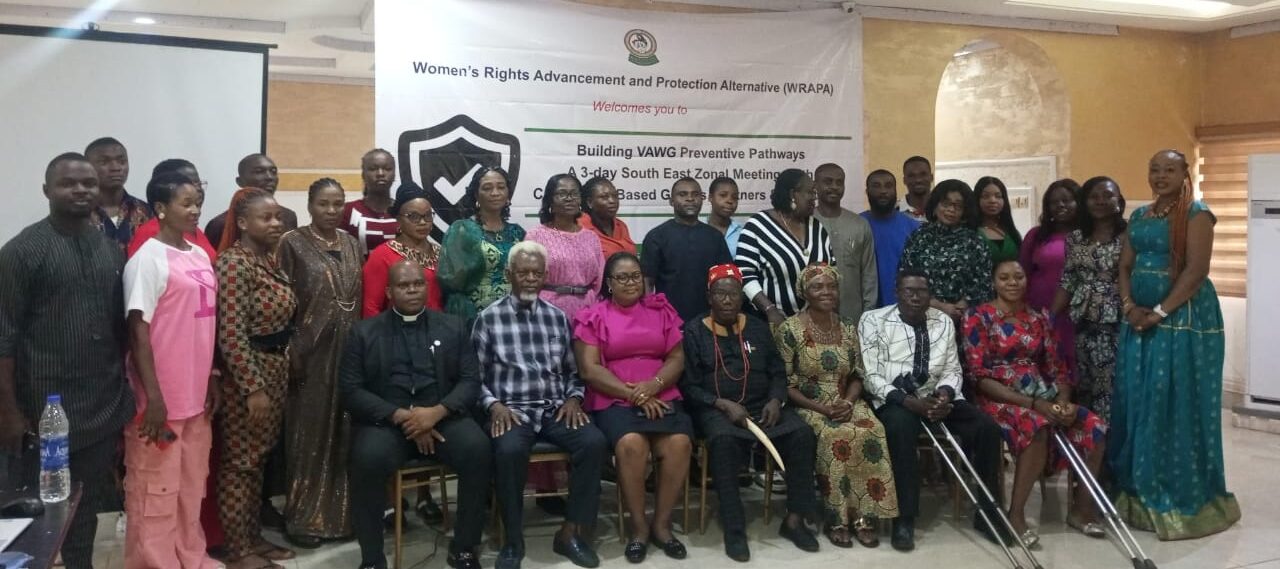Southeast stakeholders have restated their commitment to ensuring that violence against women and girls is reduced to the barest minimum in the zone.
The commitment came during a stakeholders’ meeting organized in Awka, Anambra State Capital by Women’s Rights Advancement and Protection Alternative (WRAPA).
The initiative is supported by the Ford Foundation, on Building Violence Against Women and Girls Preventive (VAWG) Pathways for South East Region.
Addressing the gathering, Anambra State Commissioner for Women Affairs and Social Welfare, Ify Obinabo, lauded the initiative of WRAPA, which she noted, aligns with the commitment of the current administration in the state.
“Governor Soludo has demonstrated the political willpower to ensure that we no longer treat violence against women and girls as business as usual. No woman will be violated without consequences except we don’t know about it.
“This problem has been there all the while. The only difference is that we are out to fight it. Most of these people doing this in Anambra State are not even indigenes. It is a dangerous cartel. But, we are equally to the task,” Obinabo assured.
WRAPA’s Director of Programme, Yemisi Nataniel, charged participants to give their best towards addressing the growing incidents of violence against women and girls.
“We invited you all because we know that you can do this. Please, approach this with the seriousness and commitment it deserves,“ she said.
In an address of welcome, WRAPA Zonal Co-ordinator for South East and Coordinator Anambra State, Ugochi Ehiahuruike, commended Anambra State Government for creating a special court to handle matters relating to gender-based violence.
In her remarks; “We are here to talk about how to prevent violence against women and girls. In Anambra State, we’ve recorded more than 190 cases before the special court. Let’s work together to be the change we want to see”.
Speaking on behalf of the academia, Prof. Uchecollins Nwogwugwu of Nnamdi Azikiwe University, Awka, remarked, “We are here to assist in any way to help the society move ahead. Most of our societal values had broken down. I will send the message write down to my university and department”.
Ugochukwu Okeke, the Chairman, Joint National Association of Persons with Disabilities (JONAPWD), in Anambra State, extolled WRAPA for making attendance to the session inclusive.
He said; “You know that PWDs are the worst victims of any kind of violence you can think of and our involvement in this programme will help us to be part of solution”.
WRAPA Acting Coordinator in Enugu, Virginia Obianyo, pledged their commitment towards ensuring that the violence against women and girls become history in the state. “WRAPA will achieve its goals and objectives in Enugu.
According to Jude Ohanele, WRAPA partner in Imo State, “There is a relationship between violence against women and girls and poverty. This is beyond women and girls, it has a link to governance and economy. It is not a mere coincidence that countries with the highest standards of living have the lowest level of violence. We need to free the women and girls for the society to progress. Fighting against violence is not for women and girls but for the progress of the state and the country”.
In a presentation on strengthening social accountability support groups and improving grassroots networks for advocacy and implementation, WRAPA Project Officer, Christiana Eguma charged stakeholders especially partners and volunteers to use their existing platforms to advance the goal of the project.
“We want this campaign to get to organic safe places such as palaces, and religious centres among others. We want to see volunteers using the WRAPA platform to push their passion in this fight.
“WRAPA is of the view that we must prevent violence. If the only thing we do is to respond to acts of violence, we will get tired. We acknowledge that CSOs are already doing something about violence against women and girls. But, we need to move away from response to prevention. Violence thrives because people have accepted it as a way of life,” Eguma concluded.



